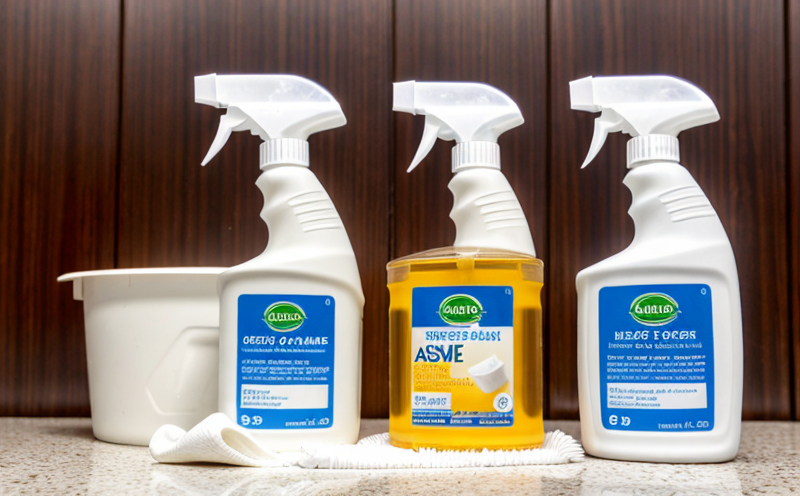ISO 18184 Antiviral Activity Testing of Treated Hygiene Products
The ISO 18184 standard is a critical tool for ensuring the efficacy and safety of hygiene products that claim to possess antiviral activity. This test measures the ability of treated hygiene products, such as hand sanitizers, wipes, and other consumer goods, to inhibit or destroy specific viruses under controlled laboratory conditions.
Hygiene products are essential in preventing the spread of infectious diseases, especially during pandemics like the ongoing COVID-19 crisis. Ensuring that these products meet stringent antiviral activity standards is paramount for public health. The ISO 18184 test protocol follows a standardized approach to evaluate the virucidal properties of treated hygiene products.
The testing process involves exposing the product, in its intended use form (e.g., spray, gel), to a suspension containing specific target viruses. The effectiveness is then assessed based on the reduction or complete elimination of these virus particles after incubation and neutralization steps. This rigorous method ensures that only products with demonstrable antiviral activity can claim such properties.
The test results are critical for several stakeholders:
- Manufacturers to ensure product efficacy
- Regulatory bodies to enforce safety standards
- Consumers to make informed purchasing decisions
The ISO 18184 protocol is internationally recognized and widely adopted. It provides a clear, reproducible method for testing antiviral activity, ensuring consistency across different laboratories and regions.
Testing Parameters:
- Virus strains: Typically includes SARS-CoV-2 (if relevant), influenza A virus, rhinovirus C
- Test duration: Incubation periods vary based on product type and intended use
- Product form: Can be gels, sprays, wipes, or other forms as specified by the manufacturer
- Neutralization step: Ensures that any remaining viral particles are rendered harmless
The process is complex and involves several steps:
- Virus preparation
- Product application
- Incubation period
- Neutralization step
- Data analysis
For successful testing, precise adherence to the ISO 18184 protocol is essential. This includes accurate preparation of viral suspensions and careful application of the test product according to its intended use.
| Virus Strain | Incubation Time (min) | Neutralization Step Duration (min) | Data Analysis Method |
|---|---|---|---|
| SARS-CoV-2 | 60 | 30 | Viability Assay |
| Influenza A Virus | 60 | 30 | Plaque Reduction Test |
| Rhinovirus C | 60 | 30 | PCR Assay |
The ISO 18184 test provides a robust framework for evaluating the antiviral efficacy of treated hygiene products. It ensures that only products with demonstrable virucidal properties are approved, thereby contributing to public health and safety.
Why Choose This Test
Selecting ISO 18184 antiviral activity testing for your hygiene products is a strategic decision that aligns with global standards. This test offers several advantages:
- International Recognition: The protocol is recognized worldwide, ensuring consistency and reliability.
- Scientific Rigor: ISO 18184 provides a standardized method for testing antiviral efficacy, minimizing variability in results.
- Regulatory Compliance: Meeting this standard supports compliance with international regulations governing hygiene products.
- Consumer Trust: Products that pass ISO 18184 are trusted by consumers who value safety and effectiveness.
The test is particularly important for manufacturers seeking to differentiate their products in a crowded market. By demonstrating antiviral efficacy, you can enhance your product's reputation and appeal to health-conscious consumers.
Moreover, ISO 18184 testing helps reduce the risk of product recalls and legal challenges by ensuring that your products meet stringent safety standards. This proactive approach fosters long-term customer trust and loyalty.
International Acceptance and Recognition
The ISO 18184 standard is widely recognized by regulatory bodies, manufacturers, and consumers worldwide. It provides a consistent framework for evaluating antiviral activity across different regions and languages:
- Regulatory Bodies: Multiple countries, including the European Union, United States, Canada, and Australia, accept ISO 18184 as a benchmark for hygiene products.
- Manufacturers: Leading brands trust ISO 18184 to ensure their products meet global safety and efficacy standards.
- Consumers: The standard enhances consumer confidence, encouraging purchase decisions based on verifiable antiviral properties.
The protocol's international acceptance is a testament to its robustness and reliability. By adhering to ISO 18184, you ensure that your products meet the highest global standards for hygiene and safety.
Use Cases and Application Examples
The ISO 18184 test is applicable to a wide range of treated hygiene products, including:
- Hand sanitizers
- Disinfectant wipes
- Multipurpose cleaning agents
- Institutional hand hygiene solutions
| Product Type | Target Viruses | Incubation Time (min) | Data Analysis Method |
|---|---|---|---|
| Hand Sanitizer | SARS-CoV-2, Influenza A Virus | 60 | Viability Assay |
| Disinfectant Wipe | Rhinovirus C, SARS-CoV-2 | 30 | Plaque Reduction Test |
| Multipurpose Cleaning Agent | Influenza A Virus, Rhinovirus C | 60 | PCR Assay |
The following are some real-world applications:
- Healthcare Facilities: Hospitals and clinics use ISO 18184-tested products to minimize the risk of viral transmission.
- Public Spaces: Schools, airports, and hotels rely on antiviral hygiene solutions to protect public health.
- Residential Use: Consumers purchase tested products for their homes, enhancing personal safety during outbreaks.
The ISO 18184 test is essential for ensuring that treated hygiene products are safe and effective in preventing the spread of viruses. Its global acceptance and rigorous methodology make it an indispensable tool for manufacturers and quality assurance professionals.





